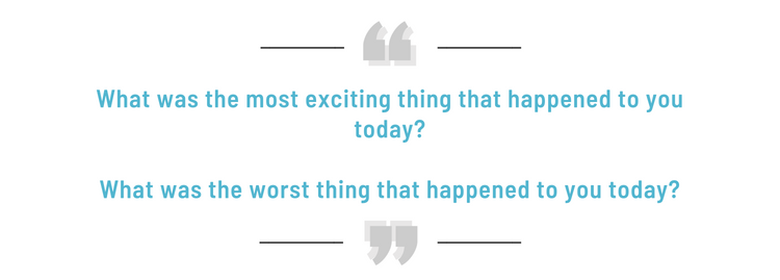On weekends, knowing what’s going on with your kids can be as easy as watching, listening, and following (or running) along. But when you’re working, it takes some skill to figure out where their little heads have been all day. Sometimes, kids offer up every detail—and other times, it’s a challenge to pry anything from them.

Reconnecting with kids after work is often a matter of asking the right questions.
“When you’re a working parent, you have to be okay with picking work at work, and then you have to be okay with picking your children. And when you pick your children, you pick them 100% in that moment,” says Julie Breazile, Senior Manager of Family Support with Kindercare. “I need them to know that they’re still my priority, and I need to build an emotional connection in that short amount of time during the week.”
While every kid responds to questions differently, it’s useful to have a set of tried and tested questions to get them talking. We spoke to moms about their techniques for getting to the heart of their kids’ day.
The Right Question First
Julie asks her 8 year old daughter Kayden and 5 year old son Brody multiple questions after childcare. The most important thing about the first question (How was your day?) isn’t the question itself, but where it takes place: In the childcare facility, with the teacher nearby.
“So the teachers are there, and they’re a part of the conversation,” says Julie. “If something happened that I need to follow-up about, it doesn’t go a couple of days before I see that teacher again.”
Jennifer Tanous, a Senior HR Reporting Analyst with Kindercare, is also strategic about the first question she asks her kids, 6 year old Issa and 3 1/2 year old Naya. Her husband picks them up from childcare, and they immediately call her from the car.
She asks them: “Did you have your best day ever?”
“I try to have them go into every day with the idea that this is going to be their best day ever,” Jennifer says. It’s a foundational part of her parenting philosophy—to let them know their mom wants them to live their best lives every day.
While Julie and Jennifer pose different initial questions to their kids, both are strategic ways to let their kids know, right off the bat, that they can’t wait to hear all about their day.

Favorites and Least Favorites
The second part of Julie’s questioning happens during their car ride home. First, she asks her kids what their favorite thing about their day was. “I always start with the good stuff and get them to talk about that first,” Julie says. Then she asks why that particular thing was good, and what they learned about that day.
“Then I try to dig into anything that bugged them or bothered them,” she says. “And then I start asking probing questions, and start digging into why they think that happened.”
The bulk of Jennifer’s questions happen during bedtime, when she asks a series of five questions, four of which are similar to Julie’s:
What was the most exciting thing that happened to you today?
What was the worst thing that happened to you today?
What made you happy?
What made you sad?
Jennifer says her kids recognize the nuance between the questions. The first two elicit answers about things that exceeded or didn’t meet their expectations. The second two tap into feelings.
Julie’s digging into her kids’ responses aims for the same result. For both moms, their initial questions about highs and lows get the kids talking about the biggest moments of their day, which are often the easiest to verbalize. But the follow-ups address their day in emotional terms—something kids don’t always know how to do on their own.
Jennifer tells her kids, “I don’t want you to hide being sad, and I don’t want you to hide being happy. I want you to share those feelings.”

Things You’re Grateful For
And Jennifer’s fifth question?
What are you thankful for?
Often, it’s the same things every day—family, friends, teachers—but it helps her kids reflect on their day through the lens of gratefulness. It’s also a valuable part of their routine, and routine is comforting.
“They’ve gotten so accustomed to it, that if I give them a choice between reading or answering the questions, because we don’t have a lot of time, they pick the questions,” she says.
Both moms say these questions help them connect with their kids, and let them know that they’re always there for them—even when they’re at work. And that’s something both working parents and their kids can be thankful for.
Culled from Themuse









Discussion about this post